How Will Google’s Ad Layout Change Affect Me?
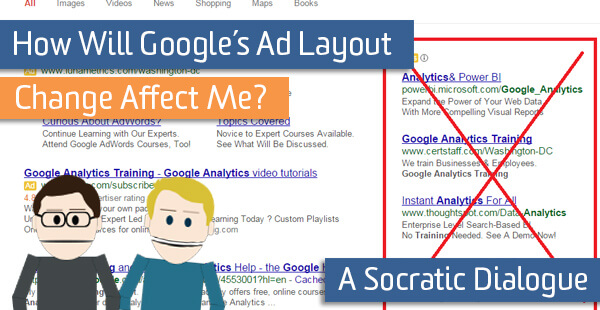
Recently, Google made some changes to the way it serves search ads on desktop, which impacts everyone in the search marketing industry.
Now, 4 ads will be eligible to serve at the top of the page, and 3 will be eligible to serve at the bottom, shrinking the number of ads and pushing organic results farther down the page. To further illustrate the changes and its impact on the industry, Stephen and I sat down to talk about the new challenges. What follows is a transcript of that discussion.
The Impact of Google’s New Ad Layout: A Socratic Dialogue

“Stephen, the internet tells me Google made a large change to their search results layout recently, and since it’s on the internet, it must be true. But I profess that I don’t know much about it. What is this change?”

“There are several changes afoot. First, no text ads will be served on the right side of the results page on desktop. And secondly, four text ads will be served above organic results for ‘highly commercial queries,’ along with three text ads at the bottom, thus shrinking the total number of possible ads in a result from 11 to 7. See my beautifully-crafted diagram below:”
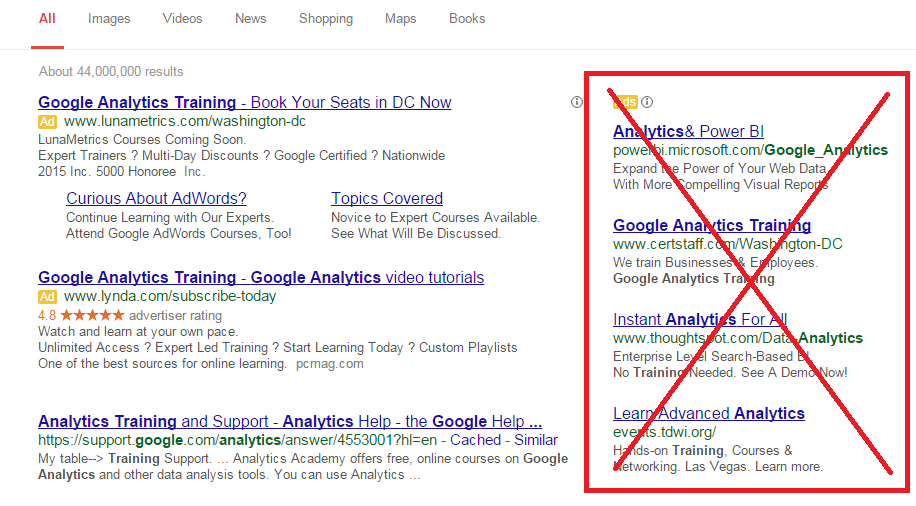

“Wow. It sounds as though the SERP is in a state of flux.”

“Isn’t it always?”

“I suppose.”

“There will still be some holdovers. Knowledge Panels and ad blocks for product listings will still appear on the side when relevant.”

“That’s strangely comforting. Now, Stephen, I must ask what prompted this sudden change?”

“Well, the implementation was sudden, but they’ve been testing this format since 2010. We believe the reason is to keep the desktop ecosystem consistent with the mobile one, providing a streamlined user experience.”

“But you just said Knowledge Panels and product listing ads will still appear on the right side on desktop, which would mean the two ecosystems are still inherently different…”

“No I didn’t.”

“Yes you did.”

“When?”

“7 lines ago. Read the script.”

“Oh, yeah. The answer is that they are still different, but responsive. This may be one in a series of moves toward a truly fluid user experience. It may stop here. There may be more customized micro-experiences like we have seen with certain shopping, travel, and insurance ad formats in the past. All we can do is monitor and adjust accordingly.”

“The cynical man might say Google implemented this change to increase competition and costs, and thus revenue, not to benefit the user. What might you say to him?”

“He may be correct, although it remains unclear how this will affect CPCs. On the one hand, with more spots at the top for ‘highly commercial queries,’ the cost of a top slot may be suppressed. At the same time, with fewer ad slots overall, advertisers will be forced to increase their bid to remain competitive. For highly competitive terms, this might mean a significant raise in costs. Again, monitor, adjust, et cetera.”

“I want to return to that concept of a ‘highly commercial query.’ We know there will now be 4 ads for those terms, but what exactly is a ‘highly commercial query?'”

“It seems to be queries where the likely intent is a purchase; searches like ‘Pittsburgh hotels’ or ‘laptops’ or ‘buy Sham-Wows! in bulk.'”

“Do you have experience with that last one?”

“Don’t judge me.”

“What about a query like ‘hunger and poverty?'”

“That sounds like the antithesis of a ‘highly commercial query.’ Why would you even bring that u…oh.”
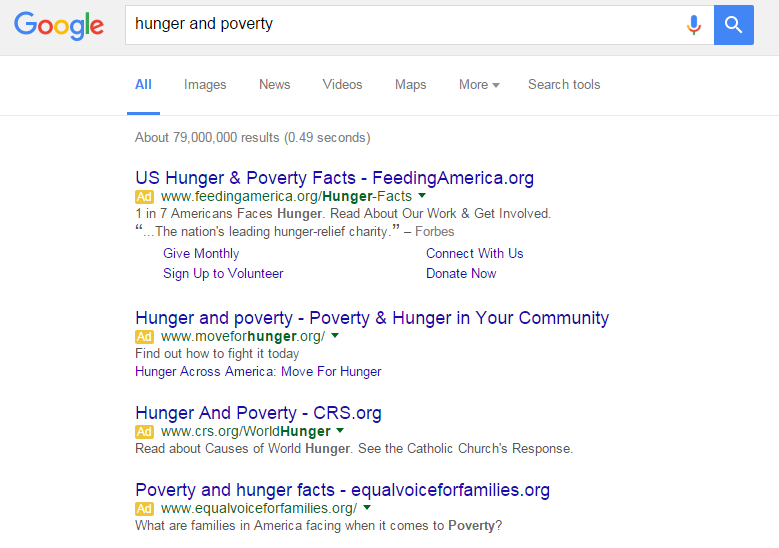

“I think Google’s definition of ‘highly commercial’ is different than ours.”

“Apparently. The lesson here is always investigate. Even if you think your keywords aren’t ‘highly commercial,’ don’t blindly trust their word. Look for yourself.”

“Is this change good or bad for paid search?”

“Define ‘good’ and ‘bad.'”

“Well, if we accept the Augustinian definition of good, where anything that has being is inherently good, and evil, or badness in this case, represents the absence of good…”

“Oh God, what have I done?”

“You know what you did.”

“A positive side effect is increased overall audience reach. With more ads at the top of the page, you should expect to have a high level of interaction with your targeted audience. The only potential negative effect is the one you have already mentioned – expected cost increases. What say you about impact on organic performance? To me, that seems like the place where we will see the biggest performance swings.”

“Well, as paid reach increases above the fold, organic reach will decrease, at least above the fold. In my post on PPC and SEO synergy, I used the example of a SERP for ‘google analytics training.’ We ranked third organically, and were barely below the fold after the ads.
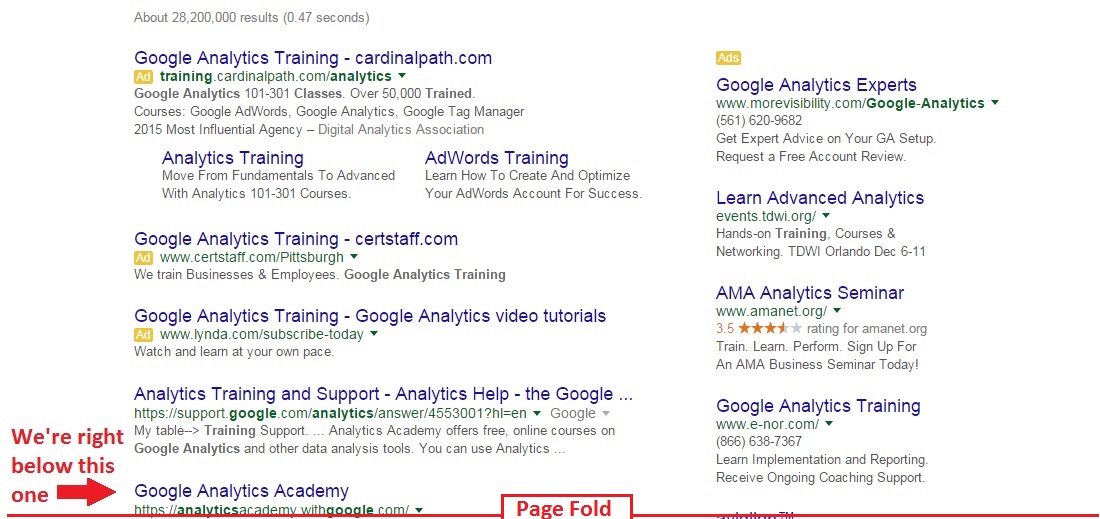
If we take a similar query now where we actually rank higher in position 2, like ‘google analytics consulting,’ look at the results:
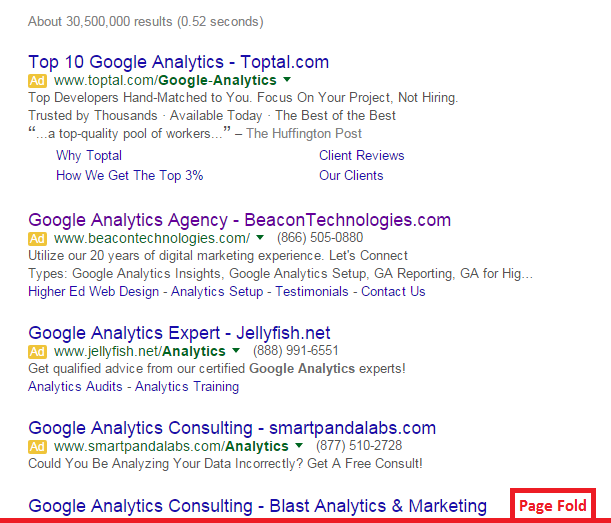
Notice anything?”

“We have an IP address exclusion to prevent our ads from showing internally because we’re awesome?”

“…”

“Oh, and there’s only half of one organic result above the fold.”

“Exactly, and it’s just peeking out.”

“Wilson from Home Improvement would be proud.”

“He would indeed. Before, our organic result in second place would be above the fold. Now, even the first result barely makes the cut. Imagine if a few more ad extensions served; that one organic result might be totally out of view!”

“So if you’re in a highly competitive market, where you have several competitors bidding on your branded keywords, your organic result might not even be above the fold for your own name?”

“Precisely. You need to look closely at the competitive landscape for your keywords and make some tough choices about both your SEO and PPC campaigns. In the case you just brought up, can you afford to not bid on your brand name? Probably not. And what about high-value, competitive non-branded keywords? How much can you afford to pay to retain that traffic? What is the impact of relying heavily on less-visible organic results? I guess time will tell, but I recommend keeping a close eye on things moving forward.”

“Wow…what a chaotic world we live in.”

“Indeed. These truly are the times that try men’s souls…You know, I really enjoyed this. I’m glad we were able to take advantage of our combined knowledge and an ancient rhetorical form to come to a greater understanding of a complex issue with potentially industry-changing fallout.”

“Me too. We should do this more often. The office could use more productive and philosophical discussion.”

*Sean sommersaults into the room, firing an automatic Nerf gun from the hip* “Hey guys, check out this cool video I found!”

“Classic.”


